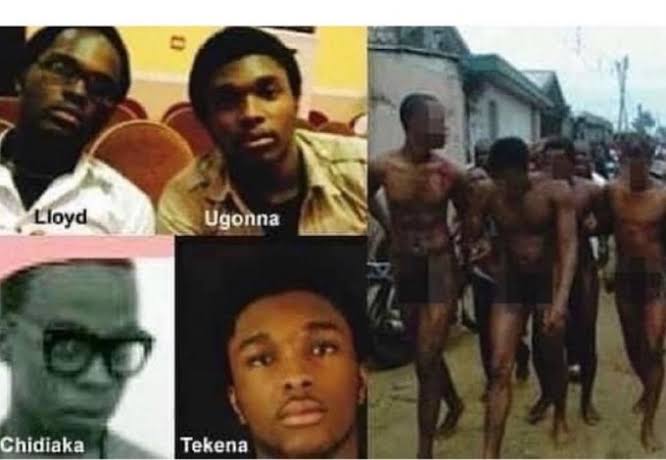Metro
FLASHBACK ALUU 4: Mob Justice Still Haunts Nigeria After 12 Years

Twelve years later, the echoes of that grisly day still linger. Despite widespread outrage, judicial consequences, and numerous public campaigns, mob justice continues to rear its ugly head across Nigeria, raising alarming questions about societal breakdown, mistrust in law enforcement, and the persistence of extrajudicial killings.
On October 5, 2012, Nigeria was shaken by one of its most tragic incidents of mob justice, now infamously known as the Aluu 4 lynching. In the quiet community of Aluu, Obio-Akpor Local Government Area of Rivers State, four young men—Lloyd Toku-Mike, Tekena Friday Elkanah, Ugonna Kelechi Obuzor, and Chidiala Loroson Biringa—were brutally beaten, paraded naked, and burned alive in a horrifying act of jungle justice.
The students, all from the University of Port Harcourt (UNIPORT), were wrongfully accused of robbery after a local debtor raised a false alarm. This moment marked a dark chapter in Nigeria’s history and exposed the dangers of unchecked mob violence.
The Aluu Incident: A Gruesome Mock Trial:
On that fateful day, the four students visited Aluu in search of a debtor who had owed one of them a significant amount of money. Rather than addressing the matter amicably, the debtor falsely accused the students of being armed robbers. What followed was swift and merciless—before any formal investigation could take place, a mob descended upon the young men, subjecting them to what can only be described as a “mock trial.”
Stripped naked, beaten with various objects, and eventually set on fire, their lives were brutally cut short, and their deaths were captured in a harrowing video that went viral on social media.
The footage sparked outrage across the country, bringing Nigeria’s troubling history of mob justice into the spotlight. As the images of the murdered students circulated, citizens demanded accountability, and the Rivers State Police Command quickly arrested several suspects.
By July 31, 2017, five years after the incident, three individuals, including a police sergeant, were found guilty and sentenced to death. However, despite these convictions, the underlying issue of mob justice in Nigeria remains deeply entrenched.
Jungle Justice: A Continuing Crisis:
Jungle justice, or mob justice as it is commonly known, refers to the extrajudicial punishment carried out by civilians, often resulting in the lynching or execution of suspects without due process. In many Nigerian communities, this act has become alarmingly commonplace. Whether it is a suspected thief, a person accused of witchcraft, or someone alleged to have committed minor infractions, mobs often take the law into their own hands. This behaviour is fueled by a deep-rooted distrust in the Nigerian legal and law enforcement systems, which many perceive as slow, corrupt, or entirely ineffective.
Since the Aluu 4 incident, there have been numerous cases of mob justice across Nigeria. In Lagos, a suspected phone thief was burned alive by an irate crowd in 2023. In Owerri, a couple accused of motorcycle theft was lynched by a mob in September 2024. These examples are only a small sample of the continued pattern of lawless retribution. The trend is widespread, affecting urban centres and rural communities alike, cutting across ethnic and religious lines.
Why Does Mob Justice Persist In Nigeria?:
Several factors contribute to the persistence of mob justice in Nigeria. Chief among them is the distrust in the formal justice system. Many Nigerians, especially those in rural areas, believe that the police are either ineffective or complicit in allowing criminals to go free. Corruption within the judiciary only reinforces these perceptions, leading people to take matters into their own hands when faced with crime.
In some instances, it takes days or even weeks for the police to respond to crimes, making citizens feel that swift mob action is the only way to secure justice.
Cultural factors also play a role. In some communities, traditional methods of justice have long been the norm, and the concept of collective punishment or vengeance against perceived wrongdoers is embedded in the social fabric. This cultural inclination, combined with the adrenaline of group dynamics, can quickly escalate into violence, with little regard for due process.
Another contributing factor is the lack of public education on the dangers and unlawfulness of mob justice. While efforts have been made to raise awareness, many still believe that jungle justice is an effective means of deterring crime. Without widespread campaigns that change this perception, the cycle of mob violence will likely continue.
The Role of Law Enforcement:
Despite these challenges, the Nigerian police force has, in some instances, taken a stand against mob justice. The warning issued by Henry Okoye, the Imo State Police Public Relations Officer, after the recent Owerri lynching, highlights ongoing efforts to curb this menace. He reminded the public that suspects should be handed over to law enforcement, urging citizens to avoid taking the law into their own hands.
Similar statements have been made by police officers across the country, yet their efforts have often been met with resistance, particularly in areas where trust in the police is at its lowest.
However, law enforcement agencies themselves face structural issues that hamper their ability to effectively combat mob violence. Limited resources, lack of training, and under-staffing mean that many police units are ill-equipped to handle large crowds or rapidly escalating situations. Until these systemic issues are addressed, the battle against mob justice will remain uphill.
Moving Forward: The Need for Reform:
Twelve years after the tragic death of the Aluu 4, Nigeria is still grappling with the realities of mob justice. The root causes of this phenomenon—ranging from distrust in legal institutions to cultural practices—require a multi-faceted approach to eradicate. Public education campaigns, stronger police-community relations, and judicial reform must be prioritized if the country is to break free from this cycle of violence.
The Aluu incident serves as a painful reminder of what happens when the rule of law is abandoned. As Nigeria reflects on this dark anniversary, the question remains: How many more lives must be lost before meaningful change takes hold?
The memories of Lloyd, Tekena, Ugonna, and Chidiala should serve as a rallying call for reform. Their tragic deaths, alongside the countless others claimed by jungle justice, demand that Nigeria rethink its approach to justice and law enforcement. Only by ensuring that every Nigerian has access to fair and timely justice can the nation finally put an end to this disturbing trend.
Metro
Police arrest herbalist over death, mutilation of 11-year-old in Adamawa

The Adamawa State Police Command has arrested a Herbalist identified as Murtala Musa, over the death and mutilation of an 11-year-old boy in Kodomun village, Demsa Local Government Area.
SP Suleiman Yahaya Nguroje, Police Public Relations Officer in a statement said the incident was reported to the police in Demsa on the 13th of April, 2025, by the Village Head of Kodomun and one Fancy Alifas, the Mother of their Victim.
“She reported that her son, Yangapwa David, aged 11, was taken to the said herbalist for treatment but unfortunately died while in his custody.”
According to her, arrangements were made to convey the body home, during which time the corpse was left in the herbalist’s room.
Shockingly, upon her return, she discovered that her son’s left eye had been removed.
“Upon receipt of the report, police operatives swiftly visited the scene and arrested the suspect.”
The Commissioner of Police, Adamawa State Command, *CP Dankombo Morris assured members of the public that the Command will leave no stone unturned in ensuring justice is served.
The suspect remains in custody as the State Criminal Investigation Department, SCID, has been detailed to conduct a discreet investigation.
Metro
Mob kills man over suspected dog theft in Bauchi

The Bauchi State Police Command has confirmed the death of a man identified simply as Peter, who was killed by a mob in Bauchi metropolis over allegations of dog theft.
This was disclosed in a statement released on Thursday by the Command’s Public Relations Officer, CSP Ahmed Wakili.
According to the statement, the incident occurred at about 11:30 p.m. on April 9, 2025, and involved a mob assault on two individuals accused of stealing a dog.
Wakili said the Commissioner of Police, CP Sani-Omolori Aliyu, has ordered a comprehensive investigation into what he described as an “egregious act of jungle justice.”
The second victim, identified as Dokagk Danladi, aged 38, was also attacked by a group of youths in a secluded area behind Lushi. He sustained severe machete wounds to the head and was rushed to the Abubakar Tafawa Balewa University Teaching Hospital (ATBUTH), Bauchi, where he is currently receiving medical treatment.
Peter, whose surname is yet to be identified, was found at the scene and was confirmed dead by medical personnel.
The Divisional Police Officer (DPO) in charge of the area has led a team of detectives to the crime scene to gather evidence and investigate the circumstances surrounding the incident.
CP Aliyu condemned the act, describing it as barbaric and a threat to the nation’s legal framework. He warned residents against taking the law into their own hands.
“No individual has the authority to brutalize a suspect. Anyone apprehended for any alleged crime should be handed over to law enforcement agencies for investigation and prosecution,” the Commissioner stated.
He appealed to the public to remain calm and cooperate with the police by providing relevant information that could aid the investigation.
“The Command is resolute in its pursuit of justice and is committed to ensuring that all those involved in this heinous act are brought to book,” Aliyu added.
Metro
Pastor sentenced to 15 years in jail for raping member under pretense of conducting deliverance

A 42-year-old Limpopo Pastor identified as Thabiso Victor Mongatane bagged 15-year jail term for r@ping a 25-year-old woman under the guise of offering her spiritual deliverance.
The Mahwelereng Regional Court, South Africa handed down the sentence for the 2022 r@pe that took place in Masodi village.
According to Limpopo Police Spokesperson Colonel Malesela Ledwaba, Mongatane exploited his position of trust and manipulated the woman into believing she was suffering from a condition that required spiritual intervention.
The incident dates back to March 2022 when the victim’s mother became ill and Mongatane was recommended by a relative to assist with her healing.
The victim brought her mother to Mongatane’s premises where he conducted what was described as spiritual treatment.
Several months later, on September 4, Mongatane prophesied over the young woman and instructed her to return two days later for further intervention related to so-called “obstacles” in her life.
On September 7, the woman complied and returned to Mongatane’s premises.
Ledwaba explained that Mongatane instructed the woman to undress and cover herself for steaming as part of the ritual.
After leaving her briefly, he returned and told her not to get dressed as he wished to continue the treatment. It was during this session that Mongatane raped her.
The victim later opened a r@pe case at her local police station. The case was taken over by the Mokopane Family Violence, Child Protection and Sexual Offences Unit, with Sergeant Lesetja Langa leading the investigation.
Mongatane was arrested on March 28, 2024, and initially released on R1,000 bail before being convicted and sentenced to 15 years of direct imprisonment.
Limpopo Police Commissioner Lieutenant General Thembi Hadebe praised the investigative team for their thorough work and welcomed the conviction, calling it a victory for justice and a message to others who exploit positions of trust.
-

 News19 hours ago
News19 hours agoJust in: Namibia Moves to Deport Over 500 Americans in Bold Visa Policy Shift
-

 News19 hours ago
News19 hours agoRivers women rally in support of state of emergency
-

 News14 hours ago
News14 hours agoYou must refund N300m, Rivers State tells NBA
-

 Politics17 hours ago
Politics17 hours agoBwala accuses Senator Ndume of plans to defect from APC
-

 Foreign15 hours ago
Foreign15 hours agoUS orders 30-day registration for all foreign nationals or face jail, deportation
-

 News19 hours ago
News19 hours agoSoldiers rescue 16 kidnapped passengers in Plateau
-

 News1 hour ago
News1 hour agoPeter Obi speaks as Benue govt. blocks humanitarian visit
-

 News17 hours ago
News17 hours agoPolice sack officer who killed one, injured two in Calabar

















